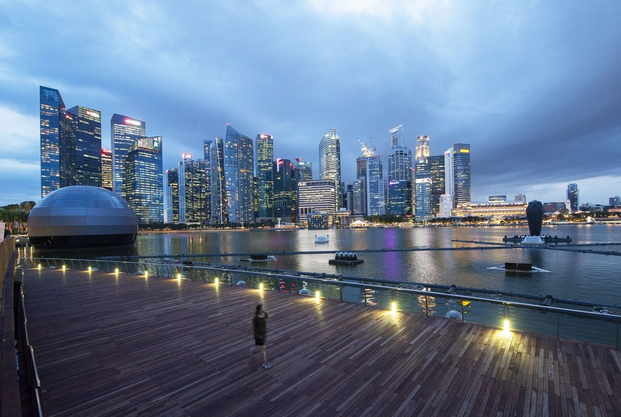SINGAPORE, March 30 (Xinhua) -- Singapore welcomes China's interest in deepening economic cooperation with Asia-Pacific countries, said Singapore's Minister for Foreign Affairs Vivian Balakrishnan, as China announced during its annual "two sessions" earlier this month that it would continue to open up.
Balakrishnan made the remarks in a recent written interview with Xinhua before departing for a visit to China.
TRADE & INVESTMENT POTENTIAL
Singapore can "play a key role" in the "external circulation" of China's dual circulation economic strategy, according to the foreign minister.
Singapore has been the largest foreign investor in China in the past seven years, he said, adding that Singapore companies can continue to tap on the large and growing market in China, in areas where Singapore's expertise best serves China's domestic economy.
"With our strong trade and logistics links to China, Singapore can be a base for Chinese companies to venture into Southeast Asia and beyond," he said.
Last year, Singapore and China celebrated the fifth anniversary of the China-Singapore (Chongqing) Connectivity Initiative (CCI), the third inter-governmental project between the two countries.
The CCI-New International Land-Sea Trade Corridor (ILSTC), which connects the 21st Century Maritime Silk Road and the overland Silk Road Economic Belt of the Belt and Road Initiative, has enhanced connectivity between China, Singapore and a wider region, said the foreign minister.
By significantly reducing the time and cost of transporting goods between Chongqing and Singapore, the CCI-ILSTC has also enhanced the trade and investment potential between China and Southeast Asia, he said.
As a key regional financial hub, Singapore is "well-positioned to serve as a gateway for Chinese investors to get access to ASEAN (Association of Southeast Asian Nations) markets and opportunities, as well as a key node to channel investments into China from the rest of the world," he added.
About one-quarter of all Chinese outward investments to Belt and Road countries now flows through Singapore, "illustrating Singapore's relevance to the Belt and Road Initiative as a financial hub for the region," Balakrishnan said.
CHINA-ASEAN TIES
This year marks the 30th anniversary of China-ASEAN dialogue relations.
"China is one of the Strategic Dialogue Partners with which ASEAN has the most substantial cooperation," Balakrishnan said.
ASEAN has become China's largest trading partner in 2020.
To further deepen economic ties, both sides are currently working to enhance the ASEAN-China Free Trade Agreement (ACFTA) to ensure that ASEAN-China economic cooperation remains "fit for purpose" in a post-pandemic world, Balakrishnan said.
This upgrade seeks to incorporate new priorities and opportunities from the pandemic, such as digital economy, public health and reduction of non-tariff measures, amongst others, he noted.
PUBLIC HEALTH COOPERATION
Touching upon the COVID-19 pandemic, the foreign minister pointed out that Singapore and China have been in close touch to share experiences and provide mutual assistance to each other since the COVID-19 outbreak.
"A friend in need is a friend indeed," he said.
In this regard, public health cooperation was included as a new pillar in the agenda of the 16th Joint Council for Bilateral Cooperation (JCBC) co-chaired by Singapore's Deputy Prime Minister Heng Swee Keat and Chinese Vice Premier Han Zheng in December last year.
Singapore welcomes China's recent proposal on mutual recognition of health certificates, Balakrishnan said, adding that this is a timely initiative as these health certificates would be an important enabler for the safe resumption of cross-border travel while protecting public health.
SUSTAINABLE DEVELOPMENT
China has made enormous progress in its poverty alleviation efforts by lifting hundreds of millions out of poverty and achieving its first centenary goal of a "moderately prosperous society," Balakrishnan said.
"We congratulate China for an achievement that is unprecedented in human history," he said.
In the future, sustainable development and environmental protection will be increasingly important, he added.
Green and sustainable development has long been one of Singapore's and China's cooperation priorities. The Sino-Singapore Tianjin Eco-city (SSTEC), one of the three Government-to-Government projects, is a good example, he said.
The SSTEC has been a successful model for China's sustainable development since 2008, said the foreign minister.
"We are deepening our collaboration on the SSTEC by supporting high-quality development in the Beijing-Tianjin-Hebei region and promoting the replication of the SSTEC's development experience to other cities in China and countries along the Belt and Road Initiative," he said.
Singapore and China adopted a Joint Paper on Enhancing Environmental Cooperation in the Post-COVID-19 Era at the 16th JCBC last December, he said, adding that this cooperation can be extend to ASEAN given the designation of 2021 as the ASEAN-China Year of Sustainable Development Cooperation. Enditem




 A single purchase
A single purchase









